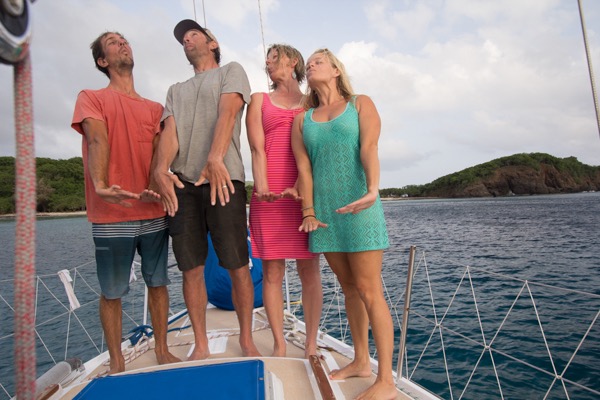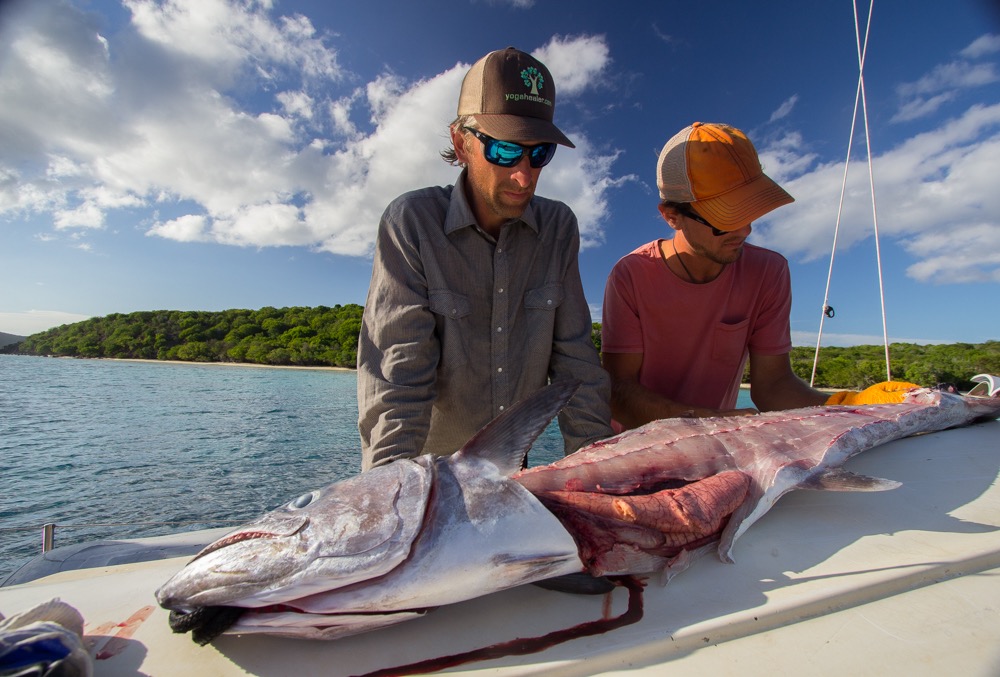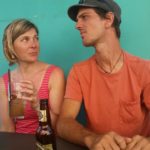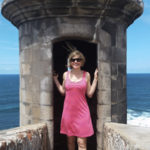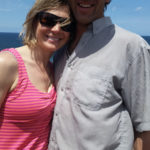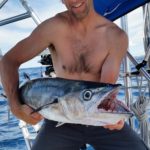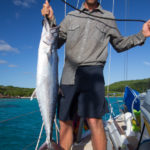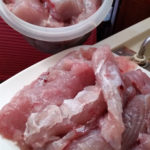We pick them up from their San Juan hotel in the morning and spend most of day wandering around the city before hitting the road to get back to Champagne on the east coast. Inclement weather means we can’t leave the next day, but that’s just as well considering that we still need to provision the boat and get everything stowed.
Natasha is a professional yoga instructor and personal health consultant. Wade is a farrier and professional cowboy, hired by the National Parks to maintain a herd of mules for summer backcountry work. Their respective careers allow them to be seasonal ski-bums and eek out full-time residence in Jackson Wyoming. Basically, their livelihood is a photographic negative of ours—they live in a tiny log cabin and work so they can play in the snowy mountains. We live on a tiny boat and work (do we?) so we can play beneath the waves. Juxtaposed, we are on opposite ends of the same spectrum.
This makes for a natural fit of personalities, but a big change in physical environments. So as we shove off into a gusty overcast morning, our guests must learn quick the need for handholds when moving, the sensation of “sitting still” on a lurching 25º angle of heel, and the pervasiveness of seawater to exploit even the slightest negligence of any packing.
In his former life, Wade worked on commercial fishing boats in New England so he is no stranger to the sea, and although it takes some time to regain his sea-legs he is stoic throughout. Natasha, to the consternation of her siblings, was automatically entitled to the front seat during road trips when we were growing up due to her propensity for motion sickness. And this is her first time at sea on a small craft. Certainly it’s not altogether pleasant, but she handles the transition with grace and a lot of napping. We set anchor on the south coast of Vieques just before sundown. It’s been a long day, but we make our intended goal, and the daily-mile-requirements are all minimal from here on.
Highlights from the near picture-perfect week of tropical island cruising: Lounging in hammocks on the beachfront under the shade of coconut laden palms; watching Wade thrive as a free-diver after getting used to feel of wearing weights; swimming at night in one of the world’s most renown bioluminescent bays; being the only vessel anchored in a glorious turquoise bay encircled by a crescent-moon beach we have all to ourselves; 13-knots of sun-kissed wind on the beam, and generally fantastic sailing conditions throughout; extra hands at the start and end of every day; catching a massive King Mackerel while under sail and enjoying one of the finest fish dinners that evening; fun hikes ending in gorgeous vistas; brilliant reef diving literally off the swim platform of our moored boat; and plenty of meandering conversations under star-lit skies.
Although the trip is an overall home-run smash hit, there is one rather significant setback. I mentioned hooking that Mackerel (the only fish we catch on the whole trip) as being a highlight, and indeed it was massive and delicious…so much so in fact that we cook up a second batch to satisfy our untempered appetites. We go to bed that night with heaps more fillets marinating in the fridge and it looks as if we’ll be eating fresh fish for the rest of the trip.
I’m the first one up the following morning, and I remember this because my stomach’s a bit unsettled. Nothing a little fresh air won’t fix, so it’s out into the cockpit for me. Good move but still a bad feeling, oh boy this is not good, and soon enough I’m feeding the fishes. By now everyone else aboard is getting up and before long we’re all complaining about woozy heads and upset stomachs.
At first, I’m not willing to believe that such a beautiful and delicious fish can be responsible for our collective sickness. I’ve been sustaining myself on reef fish for years, and I’ve never had any problems. Besides, we finally caught ourselves some good food—not to mention all the work in cleaning and prepping—so I’m not just gonna throw it all away. Well eventually the logic of the group wins out and I am forced to face the facts…we have food poisoning from the fish, and it must be discarded. Okay fine, back into the sea you go. The rest of the day is us playing musical chairs on the marine head (read tiny toilet) in-between trying to find “personal” space among four people on a 10-meter boat. The fact that during this whole process no one is cursed out and nothing mechanical brakes is a small but very significant miracle. Phew, that day’s done, can we move on now.
Oh no, it gets worse. Fortunately the gastrointestinal problems ease off, but the next day we all report having sore limbs, urgent bouts of random itchiness, and weird hot/cold sensations in our hands. Sometimes a headache comes and goes, but mostly we just feel drained and lethargic. Uh oh, can this really be what I’ve been hearing about for all these years, the reason why no one from Florida eats Barracuda?
We happen to have doctor-friend who specializes in neuro-toxins, “What fish did you say it was?” she asks over the phone as we all sit squirming in the salon scratching our feet hoping for good news, “King Mackerel, a big one, oh yeah you definitely have ciguatera.” So much for the good news. “Unfortunately there’s really not much you can do,” she goes on to, “other then refrain from eating or drinking basically everything, and getting lots of rest.”
Ciguatera occurs from consuming contaminated tropical reef fish. It cannot be detected nor can it be cooked out or otherwise removed. Usually, it slowly accumulates in the fatty tissue of an individual until reaching a certain threshold at which point s/he becomes symptomatic. Or, if you happen upon an unusually laden specimen—meaning old and therefore big—you can surpass the threshold in one fell swoop. Considering that Natasha and Wade live in the Rocky Mountains with no ready access to tropical reef fish (nor would you trust the freshness of any there found), we can safely assume that we landed the Holy Mackerel of ciguatera.
There is no cure as such, only a gradual winnowing of symptoms that can last anywhere from several weeks to several months, and there are a variety of foods which are likely to “trigger” symptomatic conditions and should therefore be avoided. Among the list is first and foremost seafood of any kind, as well as most land-based meats; all types of alcohol; coconut-derived food and drink; nut-butters of all kinds; and most tragically of all, chocolate and coffee!!
Most of these things we don’t learn until after Natasha and Wade have left—who do research of their own—and we remain in close contact to report our respective findings. Being an all-round general health nut, Natasha dives into the dietary restrictions with gusto (naturally pulling Wade along with her), while Clare and–particularly I–struggle to adjust.
Here’s to going without.
